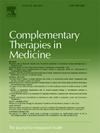The analgesic effectiveness of auriculotherapy for acute postoperative pain: A systematic review and meta-analysis
IF 3.3
3区 医学
Q1 INTEGRATIVE & COMPLEMENTARY MEDICINE
引用次数: 0
Abstract
Background
Postoperative pain is a significant yet inadequately managed complication following surgery, and auriculotherapy to alleviate acute postoperative pain (APP) and reduce the use of opioids remains controversial.
Methods
We searched the MEDLINE, Web of Science, Embase, Cochrane Library, CINAHL Complete, and ClinicalTrials.gov from inception to January 23, 2024 for all randomized controlled trials (RCTs) of auriculotherapy in the treatment of APP. The extracted data underwent risk of bias assessment, meta-analysis, subgroup analyses, sensitivity analysis, meta-regression analysis, and evidence rating.
Results
A total of 24 studies involving 2131 patients were included in the meta-analysis. Low-quality evidence indicated that auriculotherapy was effective in reducing pain intensity at 24 [MD(95 %CI)=-0.64(-1.09, −0.19), I2=77 %, P<0.01], 48 [MD(95 %CI)=-0.49(-0.97, 0.00), I2=71 %, P=0.05], and 72 [MD(95 %CI)=-0.80(-1.32, −0.28), I2=52 %, P<0.01] hours after surgery, while moderate-quality evidence showed a decrease in total opioid consumption [MD(95 %CI)=-24.41 OME (-38.28, −10.54), I2=95 %, P<0.01]. However, no significant effects were observed in reducing postoperative nausea or vomiting [RR(95 %CI)=0.61(0.32, 1.16), I2=71 %, P=0.13; RR(95 %CI)=0.32(0.09, 1.18), I2=71 %, P=0.09; RR (95 %CI)=0.34(0.11, 1.06), I2=28 %, P=0.06; for postoperative nausea and vomiting (PONV), postoperative nausea or postoperative vomiting respectively], with evidence ranging from moderate to very low. Additionally, two RCTs found that auriculotherapy could delay the time to the first request for analgesia.
Conclusions
The summary estimates indicate that auriculotherapy may be beneficial in reducing APP and opioid consumption in specific surgeries based on low-to-moderate quality evidence. However, high-quality RCTs are still further studied in different surgical populations.
Systematic Review Registration
PROSPERO database, CRD42024506989.
耳穴疗法对急性术后疼痛的镇痛效果:系统回顾和荟萃分析。
背景:术后疼痛是手术后的一个重要并发症,但却未得到充分控制,而耳穴疗法可减轻急性术后疼痛(APP)并减少阿片类药物的使用,但目前仍存在争议:我们检索了 MEDLINE、Web of Science、Embase、Cochrane Library、CINAHL Complete 和 ClinicalTrials.gov 中从开始到 2024 年 1 月 23 日所有关于耳穴疗法治疗 APP 的随机对照试验 (RCT)。对提取的数据进行了偏倚风险评估、荟萃分析、亚组分析、敏感性分析、元回归分析和证据评级:荟萃分析共纳入了24项研究,涉及2131名患者。低质量证据表明,耳穴疗法能有效降低24例[MD(95%CI)=-0.64(-1.09,-0.19),I2=77%,P<0.01]、48例[MD(95%CI)=-0.49(-0.97,0.00),I2=71%,P=0.中度质量证据显示,阿片类药物的总用量有所减少[MD(95%CI)=-24.41 OME(-38.28,-10.54),I2=95%,P<0.01]。然而,在减少术后恶心或呕吐方面未观察到明显效果[RR(95%CI)=0.61(0.32,1.16),I2=71%,P=0.13;RR(95%CI)=0.32(0.09,1.18),I2=71%,P=0.09;RR(95%CI)=0.34(0.11,1.06),I2=28%,P=0.06;分别针对术后恶心和呕吐(PONV)、术后恶心或术后呕吐],证据从中等到极低不等。此外,两项研究发现,耳穴疗法可以延迟首次要求镇痛的时间:根据中低等质量的证据,汇总估算结果表明耳穴疗法可能有利于减少特定手术中的APP和阿片类药物用量。然而,仍需在不同手术人群中进一步研究高质量的 RCT:系统综述注册:PROSPERO 数据库,CRD42024506989。
本文章由计算机程序翻译,如有差异,请以英文原文为准。
求助全文
约1分钟内获得全文
求助全文
来源期刊

Complementary therapies in medicine
医学-全科医学与补充医学
CiteScore
8.60
自引率
2.80%
发文量
101
审稿时长
112 days
期刊介绍:
Complementary Therapies in Medicine is an international, peer-reviewed journal that has considerable appeal to anyone who seeks objective and critical information on complementary therapies or who wishes to deepen their understanding of these approaches. It will be of particular interest to healthcare practitioners including family practitioners, complementary therapists, nurses, and physiotherapists; to academics including social scientists and CAM researchers; to healthcare managers; and to patients. Complementary Therapies in Medicine aims to publish valid, relevant and rigorous research and serious discussion articles with the main purpose of improving healthcare.
 求助内容:
求助内容: 应助结果提醒方式:
应助结果提醒方式:


